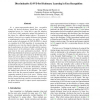Free Online Productivity Tools
i2Speak
i2Symbol
i2OCR
iTex2Img
iWeb2Print
iWeb2Shot
i2Type
iPdf2Split
iPdf2Merge
i2Bopomofo
i2Arabic
i2Style
i2Image
i2PDF
iLatex2Rtf
Sci2ools
137
click to vote
CVPR
2010
IEEE
2010
IEEE
Discriminative K-SVD for Dictionary Learning in Face Recognition
In a sparse-representation-based face recognition scheme, the desired dictionary should have good representational power (i.e., being able to span the subspace of all faces) while supporting optimal discrimination of the classes (i.e., different human subjects). We propose a method to learn an over-complete dictionary that attempts to simultaneously achieve the above two goals. The proposed method, discriminative K-SVD (D-KSVD), is based on extending the K-SVD algorithm by incorporating the classification error into the objective function, thus allowing the performance of a linear classifier and the representational power of the dictionary being considered at the same time by the same optimization procedure. The DKSVD algorithm finds the dictionary and solves for the classifier using a procedure derived from the K-SVD algorithm, which has proven efficiency and performance. This is in contrast to most existing work that relies on iteratively solving sub-problems with the hope of achiev...
Related Content
| Added | 02 Sep 2010 |
| Updated | 02 Sep 2010 |
| Type | Conference |
| Year | 2010 |
| Where | CVPR |
| Authors | Qiang Zhang, Baoxin Li |
Comments (0)

